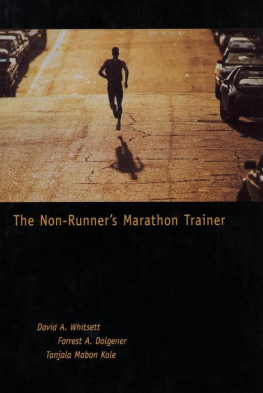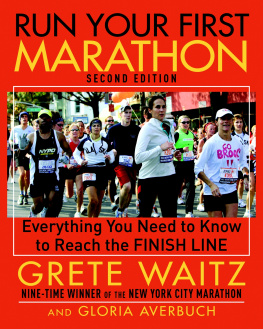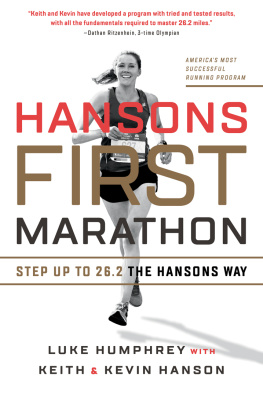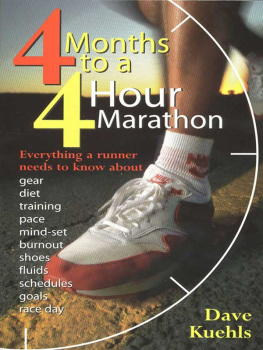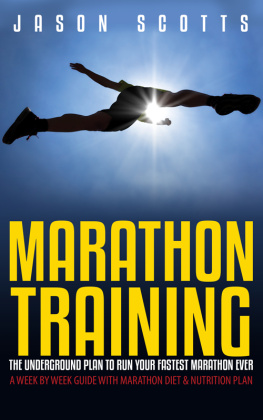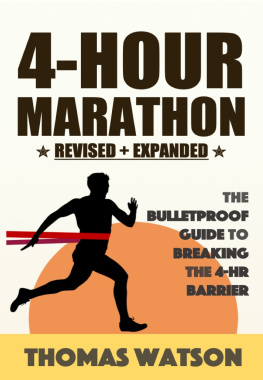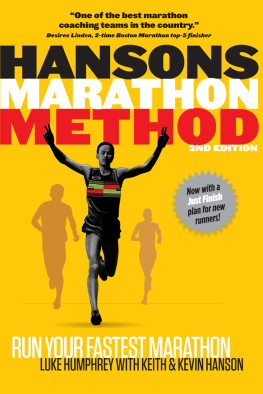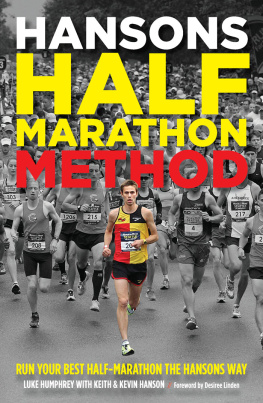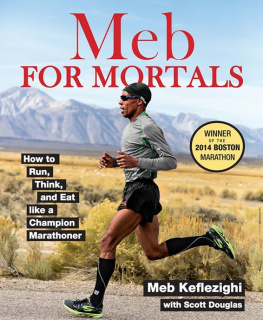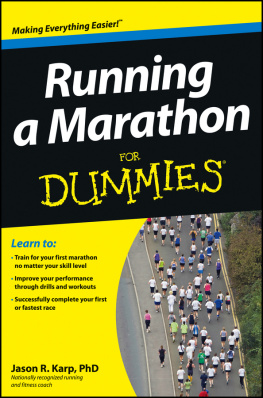The Non-Runners
Marathon Trainer
David A. Whitsett
Forrest Dolgener
Tanjala Mabon Kole


Copyright 1998 by David A. Whitsett, Forrest A. Dolgener, and Tanjala Mabon Kole. All rights reserved. Except as permitted under the United States Copyright Act of 1976, no part of this publication may be reproduced or distributed in any form or by any means, or stored in a database or retrieval system, without the prior written permission of the publisher.
ISBN: 978-0-07-150805-6
MHID: 0-07-150805-8
The material in this eBook also appears in the print version of this title: ISBN: 978-1-57-028182-2, MHID: 1-57-028182-3.
All trademarks are trademarks of their respective owners. Rather than put a trademark symbol after every occurrence of a trademarked name, we use names in an editorial fashion only, and to the benefit of the trademark owner, with no intention of infringement of the trademark. Where such designations appear in this book, they have been printed with initial caps.
McGraw-Hill eBooks are available at special quantity discounts to use as premiums and sales promotions, or for use in corporate training programs. To contact a representative please e-mail us at bulksales@mcgraw-hill.com.
TERMS OF USE
This is a copyrighted work and The McGraw-Hill Companies, Inc. (McGraw-Hill) and its licensors reserve all rights in and to the work. Use of this work is subject to these terms. Except as permitted under the Copyright Act of 1976 and the right to store and retrieve one copy of the work, you may not decompile, disassemble, reverse engineer, reproduce, modify, create derivative works based upon, transmit, distribute, disseminate, sell, publish or sublicense the work or any part of it without McGraw-Hills prior consent. You may use the work for your own noncommercial and personal use; any other use of the work is strictly prohibited. Your right to use the work may be terminated if you fail to comply with these terms.
THE WORK IS PROVIDED AS IS. McGRAW-HILL AND ITS LICENSORS MAKE NO GUARANTEES OR WARRANTIES AS TO THE ACCURACY, ADEQUACY OR COMPLETENESS OF OR RESULTS TO BE OBTAINED FROM USING THE WORK, INCLUDING ANY INFORMATION THAT CAN BE ACCESSED THROUGH THE WORK VIA HYPERLINK OR OTHERWISE, AND EXPRESSLY DISCLAIM ANY WARRANTY, EXPRESS OR IMPLIED, INCLUDING BUT NOT LIMITED TO IMPLIED WARRANTIES OF MERCHANTABILITY OR FITNESS FOR A PARTICULAR PURPOSE. McGraw-Hill and its licensors do not warrant or guarantee that the functions contained in the work will meet your requirements or that its operation will be uninterrupted or error free. Neither McGraw-Hill nor its licensors shall be liable to you or anyone else for any inaccuracy, error or omission, regardless of cause, in the work or for any damages resulting therefrom. McGraw-Hill has no responsibility for the content of any information accessed through the work. Under no circumstances shall McGraw-Hill and/or its licensors be liable for any indirect, incidental, special, punitive, consequential or similar damages that result from the use of or inability to use the work, even if any of them has been advised of the possibility of such damages. This limitation of liability shall apply to any claim or cause whatsoever whether such claim or cause arises in contract, tort or otherwise.
Contents
Foreword
Neither of us remembers exactly how it began. All we know is that in the spring semester of 1985 we taught for the first time what the students at the University of Northern Iowa now call the marathon class. We called it a seminar in Fitness and Mental Health and we had 14 students enrolled, none of whom had ever run more than three miles. The students could take the three credit hours they received in either psychology or physical education because these are the two departments in which we teach. Beginning in January, the class met twice a week for 15 weeks and the students ran 6 days each week in addition to attending class twice a week. Forrest taught one of the classes each week and lectured on such topics as cardiovascular functioning, proper hydration and nutrition. Dave taught the other class session and talked with the students about believing in themselves and using mental imagery to get through the long tough training days. The students ran on their own or in small groups and we all did the weeks longest run together on Saturday mornings. In the first week of May, when the training was done, we took them to Des Moines, Iowa to participate in the 26.2 mile Drake Relays Marathon. They all finished.
As a condition of enrolling in the course, the students had agreed to be participants in our research, so they participated in stress tests on a treadmill, kept a detailed daily log of their experiences and filled out several psychological questionnaires. Our data showed that they had improved in both physical fitness and self-esteem during the semester. When the students finished the marathon they were thrilled with their accomplishment and we were equally thrilled to have been part of their success. We agreed that we would like to teach the course again and try to get more students involved.
We have taught the course four more times since then, in 1988 with 25 students, in 1990 with 40, in 1993 with 72, in 1995 with 52 and we are teaching it again in 1998 with over 50 students as this book goes to press. Our participants have ranged in age from 18 to 55. Well over half of them have been women. Almost none had ever run more than three miles prior to training with us. Every time, all of the students have finished the marathon, (with one notable exceptionmore on him later) and every time it has had the same exhilarating effect on the participants and on us. The last few times we have taught the course, we have had so many students trying to get in (162 of them in 1995 and 199 this year) that we have had to draw names to decide which ones get to participate. In addition, we have had many members of the community in which we live who have asked to come and train with our group and we have received many requests for information on our course from faculty members of other universities and from people across the country, partly as a result of news coverage here in Iowa and partly because of an article describing our course that appeared in the October 1993 issue of Runners World magazine.
One of the 1995 participants, Tanjala Kole, suggested that we find a way to make the course content accessible to more people. She was sure there would be lots of interest in it and she even volunteered to gather and edit the recollections and suggestions of a group of former participants. We agreed her idea was a good one and you are holding the resulting book in your hands. Over the years, we have modified the training program (it now requires just four days a week of running) as well as the class content somewhat as a result of what we have learned. We have put it all here for you. Because it has worked so well for so many people, we are certain that if you follow the program and do everything it tells you to do, you can and will complete a full 26.2 mile marathon and you will feel the same sense of accomplishment and personal satisfaction that we have seen on the faces of our students.
We have found that completing a marathon contributes a great deal to increasing ones self-esteem and self-confidence. When they cross that finish line, our students believe they can do ANYTHING. Bring on the world, one of them said just after finishing, because I can handle whatever life has in store for me. A great many of them have also found that training for a marathon provides a goal-oriented way for them to develop many of the exercise and eating habits that are part of a healthy life-style. Many of them have maintained those habits for years after the marathon.

